April 3, 2020
Air Date: April 3, 2020
FULL SHOW
SEGMENTS

Economic Recovery, the Virus and Climate
View the page for this story
The world is now facing two major crises, corona virus pandemic and climate. And while COVID-19 has brought economic carnage, it also presents an opportunity to build back the U.S. economy in smarter ways to deal looming climate disruption, says Rep. Kathy Castor. The Chair of the House Select Committee on the Climate Crisis discusses with Host Steve Curwood how Congress can respond to the pandemic crisis with climate change in mind, and why the world’s pandemic response gives her hope about addressing the climate crisis. (10:39)
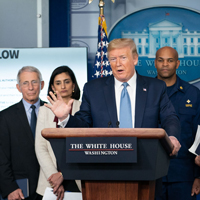
Beyond the Headlines
/ Peter DykstraView the page for this story
In this week's trip beyond the headlines, Environmental Health News Editor Peter Dykstra tells Host Steve Curwood about some environmental regulations the Trump administration is rolling back during the coronavirus pandemic. The pair also discuss Brazil's similar use of the pandemic to turn a blind eye to illegal logging in the Amazon. Finally, the two look back to perhaps the first Senate hearing on climate change, 40 years ago in 1980. (05:44)
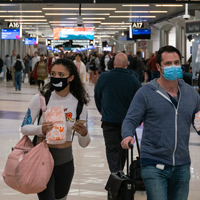
Science Denial and the Pandemic
View the page for this story
The coronavirus pandemic appears well-managed in countries like China and South Korea that moved swiftly, with the science as their guide. Countries that initially downplayed the threat, such as Italy and the United States, have seen spiking death rates as healthcare systems are overwhelmed. Harvard History of Science Professor Naomi Oreskes joins Host Steve Curwood to discuss why some governments fail to follow the science when responding to major crises like pandemics and climate change, and how acceptance of science makes governments better able to prepare and cope with these global disasters. (15:15)
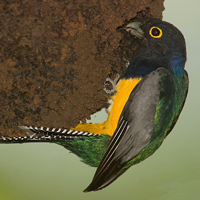
BirdNote®: Trogons Nest with Wasps
/ Mary McCannView the page for this story
Have you ever liked a restaurant so much you thought you might want to move in? That’s what the Violaceous Trogon does. This striking iridescent green and yellow Central American bird will excavate a cavity for its nest in the midst of a huge wasp nest, snacking all the while. The wasps provide a tasty bit of protein, and a natural defense against the Trogon’s predators. BirdNote®’s Mary McCann has the story. (01:52)
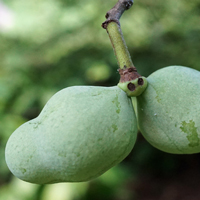
Home Bound Gardening
View the page for this story
At a time when the COVID-19 pandemic has led most of the American population to practice physical distancing, gardening can provide comfort and improved health. Landscape designer Michael Weishan, the former host of the PBS series The Victory Garden, joined Living on Earth's Bobby Bascomb to share the joys of tending to a vegetable garden, keeping chickens and enjoying the fruits of a small orchard, and to offer some advice about what to get in the ground now. (13:39)
Show Credits and Funders
Show Transcript
HOST: Steve Curwood
GUESTS: Kathy Castor, Naomi Oreskes, Michael Weishan
REPORTERS: Peter Dykstra, Mary McCann
[THEME]
CURWOOD: From PRX – this is Living On Earth.
[THEME]
CURWOOD: I’m Steve Curwood.
Congresswoman Kathy Castor says responding to the coronavirus may help chart a path for climate solutions.
CASTOR: If anything has given me hope when it comes to climate, it's this massive mobilization across the planet to tackle this pandemic, this coronavirus. And that gives me hope that we will be able to attack the other, more slow-moving crisis that's the climate crisis.
CURWOOD: Also, amid the pandemic more and more folks with backyards are growing food at home.
WEISHAN: Growing this stuff yourself in times like these is highly beneficial for everybody. It's beneficial for the environment, it's beneficial for the planet, it's beneficial for your health, for you mental health and its fun. You know, what's to object to? So I think what's old is new again in terms of victory gardens.
CURWOOD: That and more this week on Living on Earth – Stick Around!
[NEWSBREAK MUSIC: Boards Of Canada “Zoetrope” from “In A Beautiful Place Out In The Country” (Warp Records 2000)]
[THEME]
Economic Recovery, the Virus and Climate
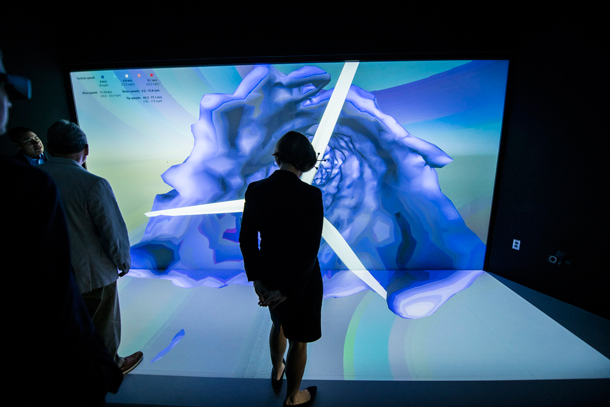
In the summer of 2019 Rep. Castor (D-FL) led a delegation from the House Select Committee on the Climate Crisis to the National Renewable Energy Laboratory in Colorado, where they toured the lab’s Insight Center 3D Visualization Lab. (Photo: Dennis Schroeder / NREL, Flickr CC BY-NC-ND 2.0)
CURWOOD: From PRX and the Jennifer and Ted Stanley Studios of the University of Massachusetts Boston, this is Living on Earth. I’m Steve Curwood at a social distance.
The novel coronavirus pandemic is turning economies upside down, but so far the US Congress has yet to address structural changes that could enhance the American economy when recovery does eventually begin. The recent 2 trillion-dollar CARES act was aimed at urgent short-term needs, so Congress did not have enough time to include climate solutions as powerful tools for a long-term economic recovery. But as Washington starts to talk infrastructure, as a way to put people back to work there is a team led by congressional Democrats that’s aiming to do exactly that. The House Select Committee on the Climate Crisis was about to release its final report when the virus crisis struck, but with this delay the legislative lane for climate action may get wider. Climate Crisis Committee Chair and Florida Democrat Kathy Castor joins us now. Welcome back to Living on Earth!
CASTOR: Well, hello from Florida. Thank you for having me on.
CURWOOD: Now, tell me first, what's the status of your committee? Initially, it was set up by the the House leadership, by Nancy Pelosi, as a Select Committee, which means it doesn't go on forever. And you were supposed to have a report by about this time of year; but of course, things have changed, huh?
CASTOR: Yes, unfortunately, we're dealing with a life and death situation, the COVID-19 pandemic. Our Select Committee on the Climate Crisis framework for congressional climate action was actually due out last week, so we were bringing it in for a landing. But if anything has given me hope, when it comes to climate, it's this massive mobilization across the planet to tackle this pandemic, this coronavirus, and that gives me hope that we will be able to attack the other, more slow-moving crisis, that's the climate crisis.
CURWOOD: At this point, though, the nation is in the midst of this crisis, this pandemic crisis. Why is it is a good time to be thinking about climate change policy?
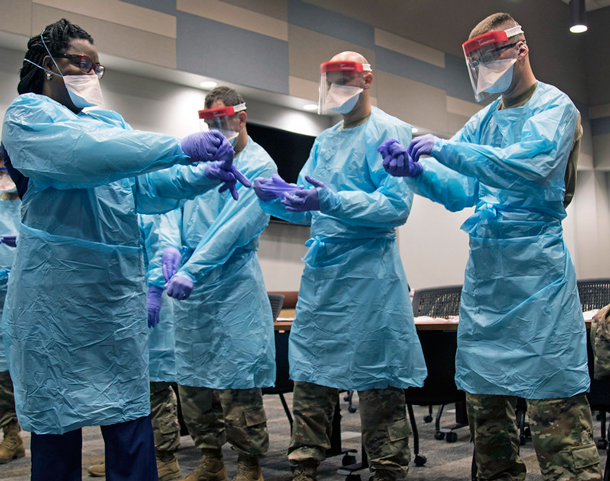
The $2 trillion stimulus package known as the CARES Act includes up to $16 billion to replenish the nation’s depleted stockpile of ventilators, medicines, and personal protective equipment, or PPE, shown here as members of the Florida National Guard assist hospital staff. (Photo: US Army Photo by Sgt. Leia Tascarini, Flickr CC BY 2.0)
CASTOR: You know, I was born and raised in the State of Florida and it reminds me of a hurricane, and when a hurricane sweeps through and it destroys your community, it destroys your home, you build back on a stronger foundation. And that's what we, we have to do going forward. The climate crisis is a public health crisis and our climate action plan that was going to be released last week, and will be released down the road, had some very strong recommendations for public health policy and how to keep our families safe and healthy, and then it spanned this entire spectrum. And I think folks will be very interested and focused on those solutions down the road. But first and foremost, it's about helping our neighbors right now and those frontline heroes in hospitals and making sure we get the the personal protective equipment to deal with the here and now.
CURWOOD: We'll come back to some elements of your report in a bit, but first, let me ask you this. How satisfied are you with the $2 trillion dollar CARES Act?
CASTOR: Well, the way you think about the emergency aid package here, the CARES Act, you think about, it provided a huge influx of funds for our frontline heroes in hospitals -- doctors, nurses -- and to develop the masks, the ventilators that we need. And then, support for our neighbors and workers through unemployment insurance and direct cash payments. The CARES Act, from a climate action perspective, provides a huge infusion to our transit systems across the country. You know, think about what they're doing right now. They're ensuring that a lot of our frontline health care workers can get to the hospital, can get to the clinic, to take care of our neighbors. There's also important investments for small businesses, and folks overlook the fact that so many of our clean energy workers are in solar and wind and this will provide a lifeline for those businesses. You know, jobs and clean energy were far outpacing jobs in oil and gas and dirty fossil fuels, and this should provide a lifeline. I wish we could have done more, though, for those clean energy companies and workers.
CURWOOD: Well, I want to ask you, what about support and the deadline extension for the clean energy tax credits, or aviation carbon limits that Democrats had sought in exchange for bailing out the airline industry? I mean, that didn't make it into this most recent package that was passed.
CASTOR: No, but we're gonna press to have it included in future packages. And a lot of those provisions related to aviation, yes, we could have done better. And they, in fact, a lot of the airline companies were in agreement on better aviation fuels and decarbonizing our airports. So I'm, I'm confident we'll get there. But the first priority: making sure that those workers and all of those folks that work at airports get the lifeline that they need to make it through the stay at home orders.
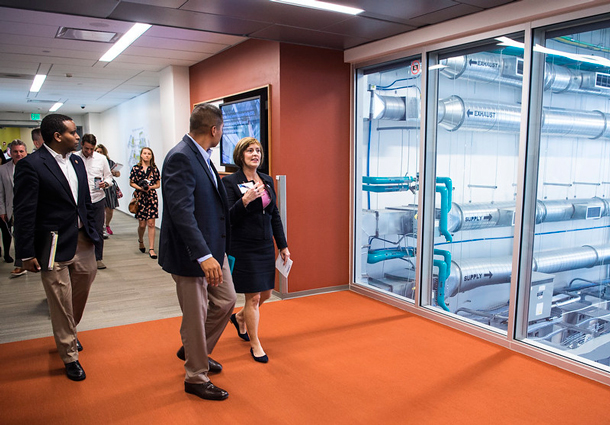
Juan Torres, Associate Laboratory Director, Energy Systems Integration, leads a tour of the National Renewable Energy Laboratory for Rep. Castor and other members of the House Select Committee on the Climate Crisis. (Photo: Dennis Schroeder / NREL, Flickr CC BY-NC-ND 2.0)
CURWOOD: Now in terms of jobs and green energy jobs, both the solar folks and the wind folks are saying without the tax credits, they're gonna be in trouble. What do you think Democrats are going to do about that?
CASTOR: Well, we've pressed hard, along with a lot of the Democratic senators to have those provisions included. I think if the Republicans and the administration had pressed forward on a bailout for oil and gas companies, or for refilling the Strategic Petroleum Reserve, then the clean energy tax credits would have traveled along with them. So we have an opportunity now to start from a clean slate, and to make the case on building that strong foundation for how we want the economy to work in the future. It has to be more sustainable. We've got to be smarter with our public dollar investments, and that means in clean energy, in more resilient communities.
CURWOOD: So give us a preview, if you're comfortable with that, of what's going to be in this major report from the House Select Committee on the Climate Crisis. What are the main goal posts in your report, do you think?
CASTOR: I'm not going to get into too many details on it because we are, this gives us an opportunity to polish it. But clearly we're charting a course for a clean energy future, one that provides an emphasis on what climate means for the health of your kids and your grandkids. I'm excited about the agriculture section, because going into this, I didn't anticipate that the agriculture community and our food producers would be so engaged. But you know, the climate's hurting them, desperately. Their, they can't grow the same crops, their livestock is suffering. There are torrential floods that are flooding out their crop lands. So they want to be part of the solution. That means sequestering carbon, that means assistance from USDA and all those great agriculture extension offices, our universities. They want to figure out how they can grow their crops to be more sustainable, how they cover their crops to make them more productive. So I'm excited about that piece. I'm excited about our investment in science and research. I was able to travel to a number of clean energy labs, like the National Renewable Energy Laboratory in Colorado, with the committee in a bipartisan way, and saw the, you know, you get a peek of what the future will be with how we build our buildings with solar, not just solar panels, but solar products that will go alongside buildings of the future. There are innovators that understand that our building materials have to change, that's going to be a source of jobs of the future. Those are a few things I'd, I'd highlight, but, but stay tuned. We're eager to get it out. But the health of the nation comes first. And that's what we're focused on now.
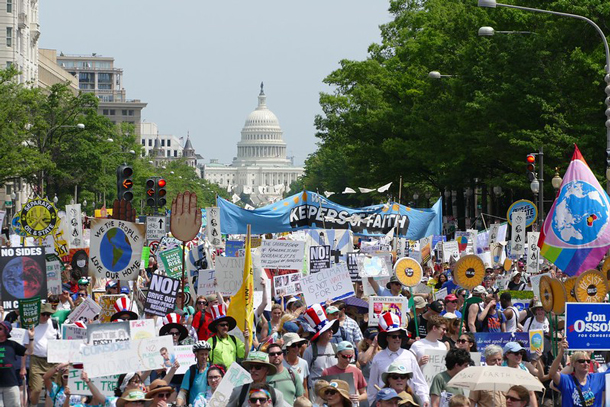
The coronavirus pandemic has put mass climate marches and protests on hold for now, but Rep. Castor says seeing the rapid mobilization across the world to tackle the pandemic crisis gives her hope about nations coming together to address the climate crisis. (Photo: Jessie Palatucci / United Church of Christ, Flickr CC BY-NC 2.0)
CURWOOD: So which of the climate policies that you've studied have proven to be the most controversial, or politically difficult as you've been working on your report?
CASTOR: Fortunately, there has been a lot of bipartisan ground that we've covered. But it's still, the kicker still is the carbon pollution reduction that comes from fossil fuels. You know, there are a lot of members of Congress who are tied to the fossil fuel industry. And what will be interesting now is the oil and gas companies are under tremendous pressure because they were overextended financially, and their workers are out of work. Do, do a lot of the members there look for a new and stronger foundation in manufacturing in the clean energy economy? And those are the kind of bridges we're going to attempt to build in the future.
CURWOOD: It's very likely that what we're living in right now is the greatest economic dislocation of our lifetimes. And the unemployment rolls are just exploding along with this virus. What does your Select Committee on the Climate Crisis have to offer in terms of policies that would create green jobs that would help us in the inevitable recovery that we're gonna have to stage?
CASTOR: Well, just like the coronavirus, the climate crisis is an unprecedented threat to our public health and safety. But in the end, hopefully it's an opportunity, to create those long-lasting, clean energy jobs for a more sustainable future for our kids and our grandkids. And I think these jobs run the gamut, yes, of course in clean energy and solar power and wind energy; but also weatherizing our buildings, the way we construct buildings and how we retrofit them, and smart grids, and smart meters. Those will be important jobs. Very important jobs in modernizing the grid across America, connecting the clean energy sources to a modern grid that will serve our businesses and serve our communities. I think the sky's the limit and, and I know folks are feeling very anxious about this pandemic and, and I hear it from the folks I represent. But the, the coronavirus public health emergency has shown that we can mobilize the planet, we can attack these enormous problems and health emergencies. And I think this ultimately will give us hope and ambition to tackle the climate crisis. And you know, in the end, we don't really have a choice. We must do this. And we can do this.
CURWOOD: Congresswoman Kathy Castor is Chair of the House Select Committee on the Climate Crisis and represents the 14th District of the State of Florida. Thank you so much, Congresswoman.
CASTOR: Thank you so much.
Related links:
- The Guardian | "$2tn US coronavirus relief comes without climate stipulations"
- Nature | "Climate vs coronavirus: Why massive stimulus plans could represent missed opportunities"
- CityLab | "A Green Stimulus Plan for a Post-Coronavirus Economy"
- About the House Select Committee on the Climate Crisis
[MUSIC: The Vignola Collective, “Slayer In the Grass” on Gypsy Grass, by Hanneman/King, Dare Records]
CURWOOD: Coming up – what the recent history of science tells us about the ability of different countries to rein in covid-19. That’s just ahead on Living on Earth.
ANNOUNCER: Support for Living on Earth comes from Sailors for the Sea and Oceana. Helping boaters race clean, sail green and protect the seas they love. More information at sailors for the sea dot org.
[CUTAWAY MUSIC: The Vignola Collective, “Slayer In the Grass” on Gypsy Grass, by Hanneman/King, Dare Records]
Beyond the Headlines
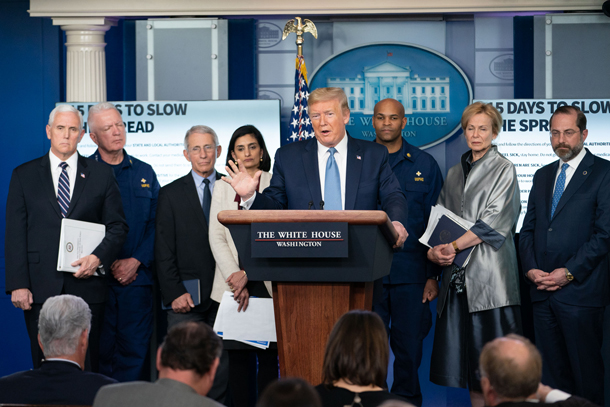
President Donald Trump and the White House Coronavirus Task Force on March 16th, 2020. (Photo: D. Myles Cullen, The White House, Wikimedia Commons, Public Domain)
CURWOOD: It’s Living on Earth, I’m Steve Curwood.
So, it's the time of the broadcast that we turn to Peter Dykstra for a look beyond the headlines. Peter's an editor with Environmental Health News, that's EHN..org and DailyClimate org. And of course, Peter, now in this time of coronavirus crisis, we have to have an appropriate social distance for these sessions.
DYKSTRA: That's right Steve, and just to be safe, I got out the calculator. And this is only an estimate, but I'm just outside Atlanta, and you're in New England, right?
CURWOOD: Yeah.
DYKSTRA: So, we are roughly 5.2 million feet apart. We're well within compliance for the CDC guidelines.
CURWOOD: Indeed. Just don't cough, okay? What do you have for us today?
DYKSTRA: We're gonna talk a little bit about the Trump administration, coronavirus, and how under the guise of the crisis, they're sneaking in some more destruction of environmental enforcement. There's a gift to the oil industry, based on an American Petroleum Institute letter to EPA, sent a few weeks ago. They complained that oil companies were being hurt by COVID-19.
CURWOOD: Peter, you sound a little cynical today about what the EPA is doing for the oil folks.
DYKSTRA: Yeah, there's a little room for cynicism here. Because five days after that memo from the oil industry's lobby group to EPA, the oil industry's wish was granted and then some. The industry sought suspension of its obligations under consent decrees over air and water pollution, over violations at their oil refineries. Some waving of requirements on the handling of wastewater from fracking, and they also wanted to be able to stop for an undetermined amount of time reporting greenhouse gas emissions and other kinds of pollution. EPA also let big oil off the hook for producing the so-called "summer blend" gasolines that we use each year. They're intended to reduce the risk of summer smog. But wait, there's more. Three states: West Virginia, South Dakota and Kentucky very quietly moved state legislation, effectively barring on-site protests against oil and gas pipeline construction. They said that such pipelines are critical infrastructure.
CURWOOD: Well, at least these moves aren't bailing out the oil industry.
DYKSTRA: Well, the stimulus package didn't bail out the oil industry. So, the EPA has bailed out the oil industry. There were efforts by some on the Republican side of the aisle to include in that $2 trillion package, some help for oil, gas, coal miners. And there were some efforts on the Democratic side for subsidies for clean energy. In the end none of them were included in the bill. So, the Trump administration, while the entire country is somewhat justifiably distracted by news coverage of the coronavirus, is quietly slipping in some more gifts to fossil fuels.
CURWOOD: Alright, Peter, what else do you see out there beyond those headlines?
DYKSTRA: Not to be outdone, Brazil's President Jair Bolsonaro invited a surge in illegal logging by scaling back environmental enforcement. And again, he blamed the coronavirus crisis as a reason to not protect the Amazon.
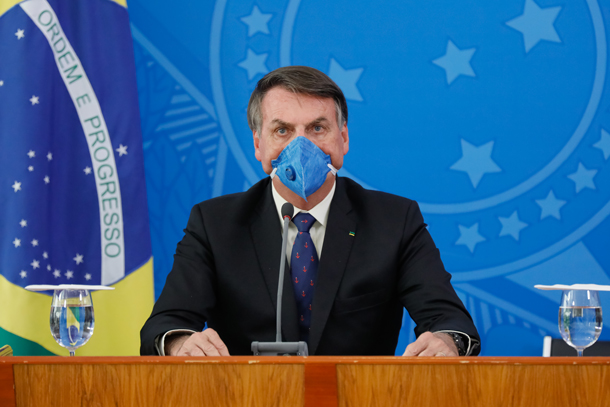
Brazilian President Jair Bolsonaro, wearing a mask before he begins a press conference on COVID-19. (Photo: Isac Nóbrega, Palácio do Planalto, Flickr, CC BY 2.0)
CURWOOD: And how's this gonna work?
DYKSTRA: He said that he was worried that field agents were going to get the coronavirus since they're not in the field, even though Brazil has been criticized for its failure to stop illegal logging. Whatever enforcement is going on is apparently going to stop. That means more loggers will go in. And ironically and tragically, that increases the risk that Amazon natives are going to be contacted with coronavirus, extending the tragedy to the deepest parts of the Amazon.
CURWOOD: Let's take a look back in history, Peter, at this moment.
DYKSTRA: April 3, 1980. 40 years ago, what's believed to be the first Senate hearing on the issue of climate change and global warming. It was chaired by the late Senator Paul Tsongas and reported on by the most trusted man in America, Walter Cronkite on the CBS Evening News.
CRONKITE: The Senate Energy and Natural Resources Committee heard warnings today that a coal burning society may be making things hot for itself.
BENTON: Researchers say increasingly large amounts of CO2 are accumulating in the atmosphere. They fear the earth will gradually become warmer, causing as yet uncertain, but possibly disruptive changes in the Earth's climate 50 to 70 years from now.
TSONGAS: Possible, probable, we really don't know. But if it happens, it means goodbye, Miami. Goodbye, Corpus Christi. Goodbye, Sacramento. Goodbye, Boston, which obviously is much more of a concern. Goodbye, New Orleans. Goodbye, Charleston, Savannah, and Norfolk. On the positive side, it means that we could enjoy boating at the foot of the Capitol and fishing on the South Lawn.
CURWOOD: And who are we listening to, here?
DYKSTRA: That was Uncle Walter, of course, the late reporter Nelson Benton, and the late Senator Tsongas being very, very prescient and talking about things that we talk about today 40 years ago. That's how much warning we've had on climate change. But apparently, whether it's climate change or coronavirus, we don't always listen to warnings from the experts. One other note on that, young Congressman Al Gore also held the first House of Representatives hearings the following year in 1981.
CURWOOD: Thank you, Peter. Peter Dykstra's an editor with Environmental Health News. That's EHN.org and DailyClimate.org. We'll talk to you again real soon, and stay safe!
DYKSTRA: Okay, you stay safe and healthy, too, Steve. Thanks a lot.
CURWOOD: And there's more on these stories at the Living on Earth website, LOE.org.
Related links:
- Inside Climate News | “Trump’s Move to Suspend Enforcement of Environmental Laws is a Lifeline to the Oil Industry”
- Mother Jones | “The Only Thing Green About the COVID-19 Stimulus Bill Is the Money”
- The Guardian | “Brazil Scales Back Environmental Enforcement Amid Coronavirus Outbreak”
[MUSIC: Vonda Shepard, “Maryland” on Women’s Work, by Vonda Shepard on Putumayo]
Science Denial and the Pandemic
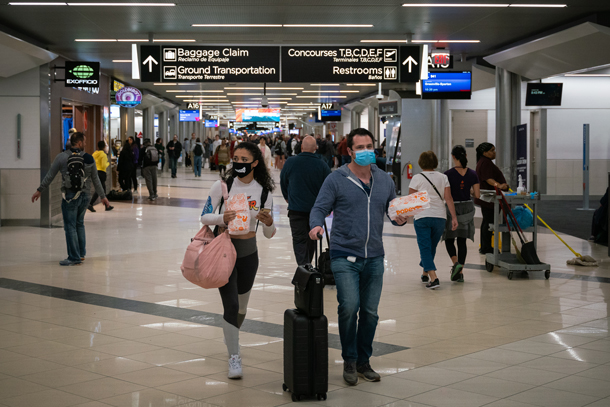
In an airport, people wear masks in an effort to prevent coronavirus spread. (Photo: Chad Davis, Flickr, CC BY-SA 2.0)
CURWOOD: A decade ago, Harvard History of Science Professor Naomi Oreskes compared climate change denial to tobacco danger denial in her book Merchants of Doubt, penned with Eric Conway and later made into a documentary film. The two then wrote a science fiction novel, The Collapse of Western Civilization, that explored a future when denial about climate science in Western countries kept them from responding to the climate crisis, while an authoritarian China did. Science denial continues today with the novel corona virus crisis. US president has often delayed action and failed to heed the warnings of his healthcare science advisors, while China’s leadership has taken more timely and successful actions. Professor Oreskes joins us to discuss the role of government and its relationship to science in this pandemic. Welcome back to Living on Earth.
ORESKES: Thank you. It's a pleasure to be here with you.
CURWOOD: First, before we get into the present moment, why did you write the collapse of Western civilization a view from the future?
ORESKES: We wrote the book for two reasons. The first was that after Merchants of Doubt was published, I got a lot of requests from people saying, Would you please explain why people don't accept climate science? And I thought, wow, I just wrote a 350-page book about that. So obviously, we need to find a way to say it again, in a different form. So the idea was basically to take that question and to answer it in a different, shorter and really sort of more fun format. But in addition, Eric, and I had been talking for a long time about what we saw as a central irony in the story of Merchants of Doubt. And that was that the people we were studying the people we refer to as Merchants of Doubt, they were fighting to protect the freedom that they were defending American democracy, American freedom, and individual liberty, against the encroachment of big government. But the irony we believed was that by delaying action on climate change, they actually made the problem worse. And they increase the odds that the kind of course of government that they hate would in fact, actually come to pass as we had to deal with the unfolding crisis. And so the idea was to write a story that would make that point.
CURWOOD: Now, in your view, we've seen China take massive measures for the coronavirus, what is it about China that allows that nation to tackle something like a pandemic so differently from other countries?
ORESKES: Well, I'm not an expert on the history of China. But I think one aspect of this is pretty obvious. When you have a large scale problem, like a pandemic that doesn't respect the borders of towns or cities or provinces or states, then you need a centralized response and a political system that centralizes power is going to be more able to respond to that than one in which power is very distributed. So even though we might dislike centralized power in certain ways, there are certain kinds of problems for which centralized power is really important and may, in fact, be the only way to address the issue.
CURWOOD: Well, President Trump would like to think that he has centralized power in his hands. Why has he been less than effective, at least in the view of many in dealing with the coronavirus outbreak?
ORESKES: Well, the President personalizes a lot of things. But the reality is that he actually was very unwilling to use the authority that he had. So right when this problem first became identified, back in January, he didn't want to empower the CDC or the National Institutes of Health to take a strong response. He also didn't want to use the powers that he had as president United States, to compel the private sector to manufacture ventilators or to manufacture face masks. Now three months in he is finally doing that and suddenly we see the private sector, GM Ford is being enlisted to do this sort of work. But the President was extremely reluctant to do that. And I think stemmed from the basic conservative view the conservative reluctant to use the power that the federal government has. And so in this case, the consequence of that reluctance is that the virus essentially went out of control. And now tens of thousands and possibly hundreds of thousands of Americans will die, Americans whose lives could have been saved if we had acted more quickly and with more organization in the early stages of this disease.
CURWOOD: So China was able to tackle the pandemic with very direct measures. What limits these kinds of measures in other countries?
ORESKES: Well, I think the really important point to make here is that you don't have to be a communist country to have an organized coherent response to a challenge. And the clear example of this is South Korea. South Korea is also a democratic country like the United States, but it's a country that has been willing to vest more authority in the centralized government. And it's also a country that acted on the advice of scientific experts early in the problem, whereas here in the United States, we have a president In who has shown his utter disdain for and disrespect for science, he has been disdainful of the scientific evidence regarding climate change. He has been disdainful of the evidence regarding the safety of vaccinations against diseases like measles. And he is hostile to science. He has attempted to cut the budgets in many scientific agencies. He has attempted to prevent scientists from traveling to scientific meetings. And many of us who track science who study science who do science have been worrying for a long time, that if you undermine scientific agencies and the federal government, that this will have consequences. And now I think we are seeing those consequences in a very, very vivid way.
CURWOOD: To what extent is your view that governments can respond to the pandemic without sacrificing democracy or freedom, but they must pay attention to reality, science?
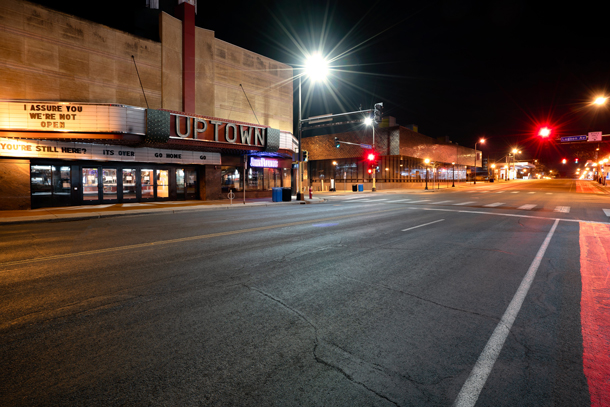
Uptown Theatre in Minneapolis during the Coronavirus outbreak. (Photo: Chad Davis, Flickr, CC BY-SA 2.0)
ORESKES: Exactly. I think you just set it as well as I could. Exactly. We don't have to be communists we don't have to be totalitarians, we don't have to be autocrats. That's the myth that some conservatives have promoted for the last 30 years, that somehow there's no way to solve the problem of climate change without succumbing to totalitarianism. But the experience of South Korea and to some extent Germany as well shows no, it's not about being totalitarian. It's about paying attention to evidence, respecting facts, respecting expertise, and then mobilizing the resources that you have in line with what the expertise is telling you. And the other really important thing that this experience shows and I think it really validates what Eric Conway and I predicted in the collapse of Western civilization. I mean, look at what's happening now, we've lost huge amounts of freedom, the idea that we were somehow protecting our freedom by disrespecting science, we've now seen how bankrupt that idea is. I mean, I'm stuck at home and so are what is it? 200 million Americans, we've lost tremendous amounts of personal liberty, and we don't know how long this is going to go on. We've also lost income, we're seeing trouble endless amounts of damage that could have been avoided if we had been willing to listen to and act upon the advice of experts.
CURWOOD: So China, and it's very much command and control economy and Germany and South Korea, different countries that you say are able to deal with the coronavirus more effectively because they believe in science. What's the solution for societies to get to governments that will operate on that basis? Because there many other places that the virus is going crazy, a lot of democratic places.
ORESKES: I think there are two things that we need to do here in the United States. The first is I think we need to rebuild our scientific institutions and in the process of rebuilding them as institutions, we can also rebuild trust. We've had 30 years in this country of decreasing support for scientific institutions, particularly federal scientific agencies, like the CDC, like the US Geological Survey, like NOAA and in the process of cutting back the budgets from Of these organizations, we've also seen these organizations subjected to a lot of hostility, a lot of criticism by political forces in Washington, DC, if we roll the clock back and think about the 1950s, when I was born, and when money was flowing into science, it wasn't just that the government was putting money into science. It was also that the government was telling us a story about why science mattered. So if you think about Dwight Eisenhower and the early years of the space program, or john Kennedy and Lyndon Johnson, who carried the space program forward, why did the American people believe in the importance of the Apollo program, it's because we were told a story, a good story, a true story, about how science could help build America, how to build our economy, how it could help build our educational systems, and how we could do cool things like put men on the moon. So I think we need to recapture that commitment to science and to scientific institutions and to scientists. The other thing though, that I think is equally important is to rebuild trust in government because the bashing of science has been linked in a very specific and direct way to a general argument against the government, particularly the argument against so-called big government. And this is something that began in the United States under Ronald Reagan, who's admired by many people and was an excellent president in certain ways but he did something that I considered to have been deeply, deeply damaging. And it's summarized by his slogan is that “the government's not the solution to our problems the government is the problem. For 40 years, we have heard that argument made by political leaders on the conservative side of the spectrum, so much so that a lot of ordinary people don't understand why we even have a CDC, the Centers for Disease Control, much less why we really need to count on them now in this current moment. And so that's about rebuilding trust in government and governance and making the point that sometimes we actually do need big government. We don't want the government telling us what to do with our lives on a day to day basis. But we do want the government to be there for us when we need it and it won't be there for us. We can't just say, oh, suddenly there's a crisis, suddenly we have to have government. No. If you want the government to be there when you need it. Well, it's got to be developed in advance.
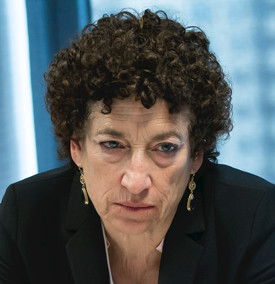
Naomi Oreskes is co-author of the novel “The Collapse of Western Civilization”. (Photo: World Economic Forum, Courtesy of Naomi Oreskes)
CURWOOD: To what extent do you think that the anti-government approach by many has led to such a low public opinion, say the United States Congress? Sometimes in the polls are done Congress, men, and women rank under used car salespeople.
ORESKES: Yes, exactly. And I think it's not a coincidence. If you grow up in an environment in which you're constantly hearing people say the government is bad, government is corrupt, government is inefficient. Well, chances are, you may begin to believe that those things are true. And the idea is that well, they can become true because then of course, if you put people in control of the government, who don't actually believe in governance, then they're not going to do a good job in building the institutions that we need. And so we have a lot of dysfunction in Washington DC right now, and so people aren't wrong. When they see that dysfunction. People correctly perceive that Congress is dysfunctional, but that is function is a product of 40 years of public policies of essentially anti-government policies.
CURWOOD: So, Professor, what's the role of infrastructure and all of this?
ORESKES: One important lesson of the coronavirus pandemic is the role of infrastructure. One of the reasons we've done poorly in dealing with the pandemic in this country is because the infrastructure that we needed to deal with it was not as well developed as it needed to be. So we've seen in the past few weeks how we haven't had enough masks. We haven't had enough ventilators. We haven't had enough personnel available to do the testing. This is all infrastructure. It's the equipment, the organization, the people, the institutions, the buildings that are necessary to address problems. And so this really shows us why you can't simply wait until a crisis is upon you to mobilize the necessary resources. I mean, here's an analogy that I was thinking about just this morning. Almost all Americans except whether you're conservative or liberal, you accept the need for an army, you accept the need for the armed forces because you know that if we were to be attacked, we wouldn't be able to mobilize an army overnight. And we certainly wouldn't be able to build battleships and airplanes and aircraft carriers, we know that we have to do that in advance, we have a notion of readiness when it comes to military matters. But many of us don't have a similar notion of readiness when it comes to public health and medicine. And yet, it's exactly the same. If we're not ready in advance, we will not be able to protect ourselves from a viral attack. And similarly, and this is the analogy that then I make to climate change. So if we think about what's coming down the road and climate change, we could be prepared for it, there are a lot of things we could do, one not to stop climate change entirely, but to lessen it to a very great degree. And to be ready to deal with it when it comes. And right now, we are doing almost none of those things. So we are very, very vulnerable to the impacts of climate change because we're not building the infrastructure now that we need. And the specific infrastructure that I'm most interested in is energy infrastructure. So we could replace fossil fuels. with renewable energy, probably at least 70 to 80% of our energy needs could be met with solar and wind power. But to do it we need infrastructure and particularly, we need energy storage infrastructure because we have to be able to store power for example, at night when the sun doesn't shine. that technology exists, but it doesn't exist at the scale we need. And right now, it's kind of expensive. So we need government research and development to try to bring down the price. If the government were to launch a major infrastructure effort, something along the lines of the Apollo program, I'm confident that within 10 years, we could have an effective energy storage infrastructure that would allow us to use renewable energy as our dominant form of energy in this country. But right now, we're not doing that. And that means that 10 years from now, we may very well be in a climate crisis, not that different from the coronavirus crisis that we're in right now.
CURWOOD: So if you were writing a book about these times from the future, maybe a novel like you did before looking at how China was able to deal with the climate and others weren't, what would be the plan. line?
ORESKES: Ah, well, if I knew that I think I would already be working on it. But I think it would be a happy story about how this crisis became a turning point. And how because of this crisis, because these issues became truly matters of life and death in front of our eyes, that the American people began to wake up. And they began to realize that there's a reason we have government. And there's a reason we have scientific institutions. And there's a reason why we spend money preparing for crises that may not happen. Nobody knew for sure that COVID-19 would happen. A lot of people predicted that something like this would happen. And of course, nobody knows absolutely, positively for sure exactly how climate change will play out. But we know that climate change will play out and it will be very damaging. And many of the kinds of damage that will occur, we can predict, even if we can't predict exactly when or exactly where. And so my happy ending story would be that this was a wake-up call and that people began to see the need to rebuild our scientific and governmental institutions and to rebuild our faith and expertise, and rebuild our faith in so-called big government, but realizing that it's not really that it's big government, it's that its efficacious government.
CURWOOD: Naomi, Oreskes is a professor of the history of science for the Faculty of Arts and Sciences at Harvard University. Thank you so much, Professor, for taking the time with us today.
ORESKES: Thank you. It's been a pleasure speaking with you.
CURWOOD: And stay safe, please.
Related link:
Our coverage on Oreskes’ book, The Collapse of Western Civilization
[MUSIC: Abigail Washburn, “What Is the Wu Force?”]
CURWOOD: Coming up – Gardening in the time of Coronavirus is just ahead on Living on Earth.
ANNOUNCER: Funding for Living on Earth comes from you, our listeners, and United Technologies, combining passion for science with engineering to create solutions designed for sustainability in aerospace, building industries, and food refrigeration. UTC companies such as Otis, Carrier, Pratt and Whitney, and UTC Aerospace systems are helping to move the world forward. You can learn more about United Technologies by tuning into the Race to Nine Billion podcast; listen at racetoninebillion.com.
[CUTAWAY MUSIC: Sultans of String, “Stomping at the Rex” on Yalla Yalla, by McKhool & Laliberte, Ontario Arts Council]
CURWOOD: It’s Living on Earth, I’m Steve Curwood.
[BIRDNOTE THEME]
BirdNote®: Trogons Nest with Wasps
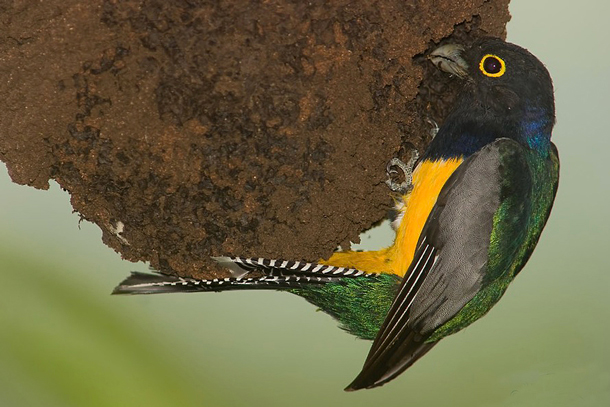
Move in day! A Violaceous Trogon checks out a possible nest site, in a huge wasp’s nest. (Photo: © Greg Basco)
CURWOOD: Well, they say home is where the heart is and to be safe at home Trogons take that need to an extreme. Here’s Bird Note’s Mary McCann.
BirdNote® Trogons Nest with Wasps
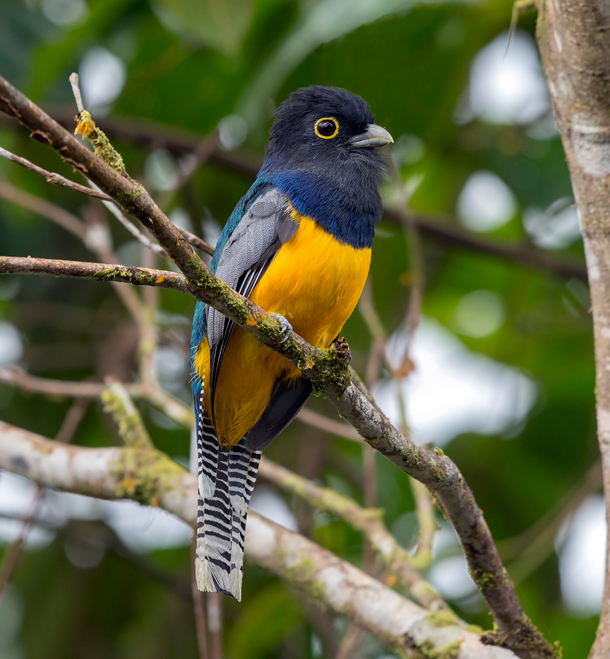
The striking iridescence of the trogon’s blue feathers is the result of back pigments arranged in a structure that reflects light in a very particular way. (Photo: Doug Greenburg, Flickr, CC BY-NC 2.0)
[Call of the Violaceous Trogon] When it comes time to nest, birds require a site that protects them, both from weather and from predators. Nests are perched high in trees, secreted deep in dense branches, or concealed in cavities. Some birds take a further step — nesting where they are defended by stinging insects.
The Violaceous Trogon (pronounced TRO-gahn) of the New World tropics often excavates its dwelling within a large, active wasps’ nest. [Violaceous Trogon call] The Violaceous Trogon is a striking bird, ten inches tall with a deep blue head and breast and bright yellow belly. It’s adept at catching insects, and it begins its work at the wasps’ nest by eating some of the wasps. A pair of trogons then digs a cavity within the massive nest, large enough to accommodate themselves and their eggs. [Violaceous Trogon call]

Trogon’s and their close relatives Quetzals are known for extravagantly colorful tail coverlets, the ordinarily small feathers which cover and protect the base of the tail. (Photo: Doug Greenburg, Flickr, CC BY-NC 2.0)
While they may continue to snack on resident wasps throughout nesting, the trogons never eliminate all the wasps. And they create a nest that few predators would dare disturb.
Some birds nest in large ant or termite colonies, too. Safety is where you find it.
###
Written by Bob Sundstrom
Call of the Violaceous Trogon provided by The Macaulay Library of Natural Sounds at the Cornell Lab of Ornithology, Ithaca, New York. Recorded by C.A. Marantz.
BirdNote’s theme music was composed and played by Nancy Rumbel and John Kessler.
Producer: John Kessler
Executive Producer: Chris Peterson
© 2016 Tune In to Nature.org January 2013/2018/2020 Narrator: Mary McCann
ID# 011507VITRKPLU VITR-01b
https://www.birdnote.org/show/trogons-nest-wasps
CURWOOD: For pictures buzz on over to the Living on Earth website, loe.org
Related links:
- Read more on the BirdNote website
- Click here to watch a video of the Violaceous Trogon in action
[MUSIC: Michala Petri, “Variations brillantes for descant recorder and harpsichord, variation IV” on The Virtuoso Recorder, by Ernst Krahmer, RCA/BMG]
Home Bound Gardening
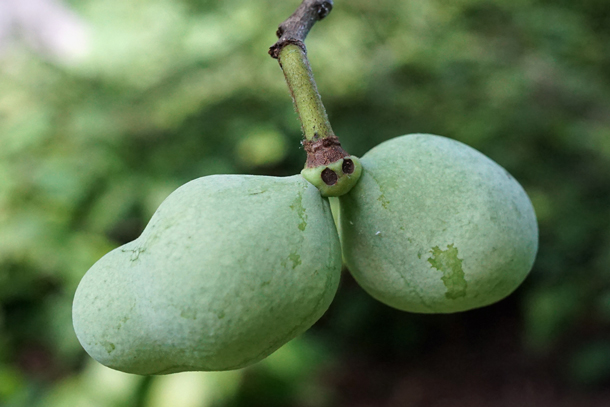
Paw paw trees can grow in moist areas and survive temperatures of about -25 degrees Fahrenheit. They provide a rich tropical fruit and their flavor has been compared to that of mangoes and bananas. (Photo: Plant Image Library, Flickr, CC BY-SA 2.0)
CURWOOD: Seed companies are reporting record sales this spring. With so many people isolated at home and the economy so wobbly, for those with the space it does seem like a fine time to grow some food. So for some tips on how to get started with gardening we reached out to Michael Weishan. Years ago he did regular gardening segment here on Living on Earth. He then had his own show on NPR , and went on to host the Victory Garden on PBS. Today Michael owns a landscape design company outside Boston. He spoke with Living on Earth’s Bobby Bascomb, who is also an avid gardener and keeps a few chickens.
BASCOMB: So where are you right now? And how are you dealing with, you know, the isolation at the moment?
WEISHAN: Well, you know, in some ways, if you're a gardener, you're never that isolated. I have a greenhouse full of friends and ducks and chickens and geese here. I have a small property outside of Boston. And they require tending. And so you know, in the garden, nature goes up, it gets your mind off a lot of other things.
BASCOMB: Right, for sure. You know, I keep thinking the one saving grace of this is, at least this outbreak is in the Spring, you know, we can get outside and of course, it's the best time to start planting a garden, generally speaking, thOUGH what's, what's good to start right now in the garden?
WEISHAN: Well, you know, obviously depends on where you are. But here in the Northeast, all the cold weather crops can go go in. And I'm thinking at the moment mostly about vegetable gardening, not only because, you know, we'd love to have fresh produce that I don't have to have any risk of harvesting or purchasing, but also because that's what really goes on at this time of year in terms of new activities. But pretty soon it'll be time to plant any type of seeded annuals and flowers for the summer garden, certainly all the vegetables, it's time to start now indoors, tomatoes and peppers and all those things. So there's plenty, plenty to do.
BASCOMB: Mm hmm. But right now, you could throw some pea seeds in the ground lettuce, spinach, that sort of thing would be okay.
WEISHAN: Yeah, absolutely. As a matter of fact, the leak we start them generally in January indoors, so they're ready to go outside, as are some of the onion sets. Anything that's cold hardy, the peas in particular would very much thrive at this time, as long as it's not too damp.
BASCOMB: Well, you and I are both in New England but what about other parts of the country where maybe it's warmer or, or even colder? What's a good thing to start, say on the West Coast or in the middle of the country?
WEISHAN: Well, in the beautiful West Coast, like for instance, in California, Oregon and Seattle, I mean, they're very much into full spring now. So anything is about you know, ready to go. The nurseries that are open, of course, are fully stocked. And plants have any type of descriptions, you know, in California they can grow a lot of this stuff year round. In the south again, they're just ahead of where we would be up here in the North by about a month or so. So they will be planting all the warm weather crops now the tomatoes and other things because their frost dates have passed. So any you know, non hardy annuals, non-hardey perennials, all the types of material that we would normally get around to planting here in the New England in May is high time in the Southern states.
BASCOMB: Well, for someone that's maybe never grown a thing but they're trapped inside right now and looking at gardening is maybe you know, something to keep themselves busy a new hobby. What are a few things that are easy to grow, that anybody could get started with?
WEISHAN: Well, there is such a new explosion of houseplants. As people's garden sizes have condensed and frankly, a lot of people are gardenless gardeners they live in apartments or other places. There are just an amazing number of plants available. There's some really great specialty nurseries where you can order plants for almost any type of light situation. I mean, there are some houseplants you only have to water once or twice a month so for people who travel or people just don't like watering, that's a really great option.
BASCOMB: I went through a stage where I was growing micro greens I was growing a ton of micro greens I've kind of stopped now but that seems like a good option too. You don't need a lot of space and they don't even really need a whole lot of sun.
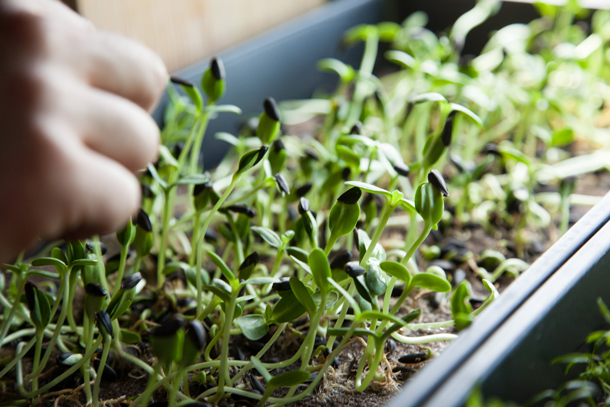
Microgreens are a simple way of incorporating fresh ingredients for cooking at the comfort of your home. Some of the post popular microgreens include pea shoots, radish sprouts, sunflower shoots and wheatgrass. (Photo: Plant Chicago, Flickr, CC BY-NC-ND 2.0)
WEISHAN: Anything that is a leaf plant generally requires more sun than not, but the micro greens are a really good option. I for instance, have started to grow just on flats on my back deck. Most of the herbs that I would grow in the garden like cilantro, arugula, all these small little lettuce greens because it gets them up out of the way and they don't get eaten by every every test in the world or the you know the chickens can't get into them either which you know if you have chickens you know that they're notorious if they get out of their coop area, you know, in terms of destroying very quickly a garden bed.
BASCOMB: Yeah, I have three chickens actually, my daughters have named them Snowball, Flip-Flop and Sheila and they're, they're a lot of fun! You have chickens as well, is that something you think that is a good option for people?
WEISHAN: I have been a huge, huge proponent of everyone having chickens. You don't need a rooster. You just need a couple of hens. And you know the nice thing that most people don't realize is that chickens are by nature omnivores, they eat anything. Now mostly we feed them grain when you buy food at the store, for instance, pellets and things but during both world wars, the governments here and in Great Britain urged people to have chickens to feed them food scraps because you can totally raise chickens on all the scraps from your table. And so instead of wasting any food at all, and they love everything, spoiled yogurt, old pasta, you know any greens you have. One of their favorites, for instance is watermelon rind, which sounds totally strange but they will literally eat it until just the film of the exterior skin remains they just just love it. So you know, all the bits of rice, little bits of meat, anything that you have can go out to the chickens and they just love it and produce these spectacular eggs. So it's a complete circle. You know, if you have the room in the space, it's a wonderful thing. And the eggs, of course are phenomenal they don't taste anything like the eggs from the store.
BASCOMB: I have an ongoing, let's call it discussion with my husband, he always wants to give the chickens the leftover eggs from breakfast, and I feel like that's cannibalism and gross. What's your opinion?
WEISHAN: It is actually very, very good for them.
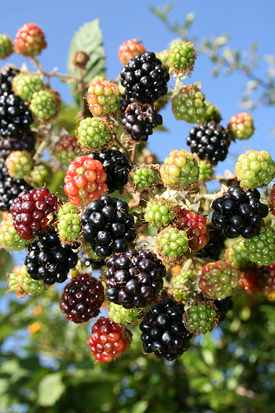
With the right conditions and rich soil, berries can almost grow themselves. Blueberries and currants can be planted year-round, while raspberries can be planted during winter and spring. (Photo: John, Flickr, CC BY-SA 2.0)
BASCOMB: Really?
WEISHAN: Yes, absolutely. The egg shells in particular should go back because they have a terribly hard time getting enough calcium in their diets unless they're allowed to free range. And so if you ever drop an egg in the coop, they immediately run to eat it and eat the shells and eat the yolk. And so that's actually very highly nutritious for them. So the egg shells in particular, you should always send back to the chickens.
BASCOMB: Hmm. All right. Well, that's good to know. But you know what now I'm gonna have to go tell my husband that he was right, so..
WEISHAN: That's always the toughest part.
BASCOMB: Yeah, exactly. What about some easy fruits that people might think about growing?
WEISHAN: Well the easiest fruit in the world of course is a raspberry which technically isn't the fruit but you know that old adage about tomatoes being fruits and you know, you know, the long Supreme Court debate on that. But, you know, the small berries, for instance, are the easiest thing in the world. They're all brambles by nature. They are the native varieties of them are essentially weeds. I grow a variety here called canby that is a particularly fantastic late season raspberry that has no spikes, so you don't get stabbed when you're trying to harvest them and they're literally the size of your thumb. They're fantastic and fantastically delicious raspberries. Thornless varieties are just really fantastic. So I grow a lot of that I grow blueberries I grow raspberries and they grow themselves, gooseberries, currents, all that stuff very easy to grow. You can order it online. It takes a year or two to kind of get started. But once it does, it's just I mean I gallons and gallons of raspberries we had last year. So easy peasy. Easy peasy.
BASCOMB: Yeah, we have a bunch of raspberry bushes here as well. And I swear if we didn't prune them back every year, they would take over the yard entirely. They're just so prolific.
WEISHAN: Absolutely. And they keep trying to get out of their constraints, which is a huge problem. We have a fenced in and they get under the fencing and then into the main garden. And it's like, oh my god, it's all the pains and pleasures of gardening.
BASCOMB: Yeah, exactly. Exactly. It's not a bad problem to have too many raspberries.
WEISHAN: No, no, I could think of other much more serious problems.
BASCOMB: All right, well, I'm thinking about trying to grow paw paw trees. I understand that with climate change the Paw paws are actually more suitable for this area of New England and maybe they used to be. Do you have any experience with those?
WEISHAN: I have a whole papa clump, and that's what happens to paw paws they actually start to spread out via runners and become multiple trees. It is one of my absolute favorite fruits. It requires though a moist site. They are native to this part of the world and grew along a stream banks and sort of marshy areas and I have a fairly large pond and back and I planted it on the bank and it is unbelievably happy. It has grown probably, oh, I don't know, 20 feet in the last seven or eight years and every fall it rewards you with this incredible crop of paw paws. Which, for any of our listeners that don't know what a paw paw is, it's a it's akin to the tropical breadfruit so it looks kind of like a crumpled banana. I know a misshapen small banana but inside is something that is more akin to custard. A creamy, wonderful custard. The only downside is that they have fairly large big black seeds, which like watermelons of old you have to spit out. But they're fantastic. You bring them into the house, they scent the whole house with this incredible tangy custard smell. The blooms are very beautiful as well. They're purple In the spring pendant, and are interestingly they're pollinated by flies and other types of insects that are attracted to putrid smells because they have a, I have never I never can smell it, but some people say they can smell a little bit of like rotting meat.
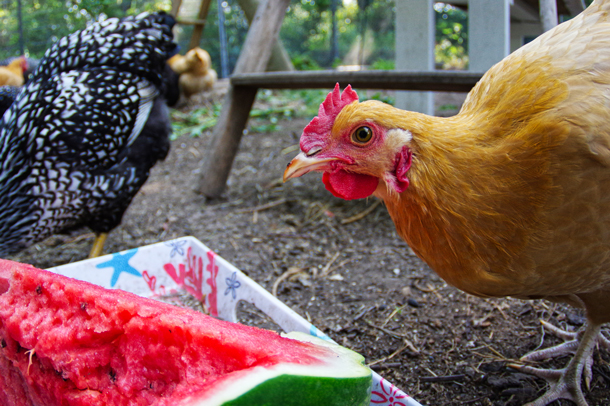
If you have the space, chickens can be a great addition to your garden. They are known to enjoy eating berries, mealworms, and watermelon. (Photo: Art by Heather, Flickr, CC BY-NC-ND 2.0)
BASCOMB: Okay, that's not a selling point.
WEISHAN: That doesn't sound attractive, but the flowers are beautiful, but their pollinators are early flies, which is great because they flower long before our bees are actually moving.
BASCOMB: Oh, interesting. Well, I'll have to try that I actually have a swampy area on my property as well. Maybe I'll plant some over there cuz I don't really know what to do with that space. Anyway, it's it's all wet and mucky. Like, you know, 10 months out of the year.
WEISHAN: Well, I'm making an offer. You come here fairly soon, we'll go out and dig you up one. As I said, they grow kind of via runners. And so you plant one and then soon you have kind of a cluster of them around. So if you need a paw paw I’ll dig you up one.
BASCOMB: Okay, I will turn up on your doorstep.
WEISHAN: Guaranteed I've no seriously I anything I can do to like promote paw paws I think it's absolutely fantastic.
BASCOMB: Oh, okay. Well, social distancing aside, I may I may have to come and get a paw paw, I really will.
WEISHAN: How about if I leave it in the middle of the driveway? With some lysol wipes.
BASCOMB: That sounds great. Well, you know, for me, I think the wonderful thing about gardening is that obviously, you're getting fresh food and it's organic if you're if you're growing organically, but especially right now there's something really therapeutic about getting out and just getting your hands in the dirt.
WEISHAN: Absolutely. It's sustaining, and so you both get something out of it in terms of productivity, but you actually get something from it in terms of mental improvement. You know, I've been watching the news, I happen to be something of a news junkie. So I watch PBS, I watched the national news on NBC you know, I'd listen to NPR and the news is all dire from every front. And so I start to get get to a point where it's like I've got to get out of here and so I've been going on the last day or so in building the garden fence and hoeing the soil and getting the peas in and the other kind of thing. And it just, it's been proven to be mentally helpful. It's on par with meditation. So you have cardiovascular improvement, you have mental health improvement, it lowers blood pressure, because it's a calming effect. These things have all been researched are proven. In general, there is just a huge benefit from gardening. So I mean, you get the product, it gives you, you know, increases productivity, the property, but it just increases your health. So it's in many ways, you can see why it's the most popular hobby in the United States.
BASCOMB: Now, during World War One and too many governments encouraged people to grow Victory Gardens as a way to sort of supplement their food and as part of the war effort. And you know, right now, it sort of feels we're like we're at war, but with an invisible enemy of this pandemic. Do you see any any parallels there?
WEISHAN: You know, during those both wars, as you mentioned, people absolutely. were encouraged by the governments both here and in Great Britain to grow produce, because A, it didn't have to be transported all these long distances. And secondarily, we didn't have to pay for the supply chain. So it was very healthy in terms of lack of oil use and preservation of supplies for the war effort. But also it gave people a source of fresh produce that they might not otherwise have. The same problems, then are the problems now, we're talking about supply chains, we're talking about not being able to get products from one end of the country to the other. So you know, growing this stuff yourself in times, like these is highly beneficial for everybody. It's beneficial for the environment, it's beneficial for the planet, it's beneficial for your health, for your mental health and it's fun. I mean, you know, what's the what's the objective? So yeah, absolutely. I think what's old is new again in terms of Victory Gardens.
BASCOMB: Michael Weishan is a landscape designer, author and former host of the Victory Garden on PBS. Michael, thank you so much for all of the helpful tips.
WEISHAN: Oh, it was truly my pleasure.
CURWOOD: Uber gardener and Landscape designer Michael Weishan, speaking to Living on Earth’s Bobby Bascomb.
Related links:
- Click here to contact Michael Weishan and learn more about his landscape design work
- Learn more about victory gardens spending around the United States
[MUSIC: Miles Davis, “So What”, on Kind Of Blue, Columbia Records]
CURWOOD: Living on Earth is produced by the World Media Foundation.
Our crew includes Naomi Arenberg, Bobby Bascomb, Paloma Beltran, Thurston Briscoe, Jenni Doering, Jay Feinstein, Merlin Haxhiymeri, Candice Siyun Ji, Don Lyman, Isaac Merson, Aynsley O’Neill, Jake Rego, and Jolanda Omari.
Tom Tiger engineered our show. Alison Lirish Dean composed our themes. You can hear us anytime at L-O-E dot org, iTunes and Google play- and like us, please, on our Facebook page - Living on Earth. We tweet from @livingonearth. And find us on Instagram at livingonearthradio. I’m Steve Curwood. Thanks for listening!
ANNOUNCER: Funding for Living on Earth comes from you, our listeners, and from the University of Massachusetts, Boston, in association with its School for the Environment, developing the next generation of environmental leaders. And from the Grantham Foundation for the protection of the environment, supporting strategic communications and collaboration in solving the world’s most pressing environmental problems. Support also comes from the Energy Foundation, serving the public interest by helping to build a strong, clean, energy economy.
ANNOUNCER 2: PRX
Living on Earth wants to hear from you!
Living on Earth
62 Calef Highway, Suite 212
Lee, NH 03861
Telephone: 617-287-4121
E-mail: comments@loe.org
Newsletter [Click here]
Donate to Living on Earth!
Living on Earth is an independent media program and relies entirely on contributions from listeners and institutions supporting public service. Please donate now to preserve an independent environmental voice.
NewsletterLiving on Earth offers a weekly delivery of the show's rundown to your mailbox. Sign up for our newsletter today!
 Sailors For The Sea: Be the change you want to sea.
Sailors For The Sea: Be the change you want to sea.
 The Grantham Foundation for the Protection of the Environment: Committed to protecting and improving the health of the global environment.
The Grantham Foundation for the Protection of the Environment: Committed to protecting and improving the health of the global environment.
 Contribute to Living on Earth and receive, as our gift to you, an archival print of one of Mark Seth Lender's extraordinary wildlife photographs. Follow the link to see Mark's current collection of photographs.
Contribute to Living on Earth and receive, as our gift to you, an archival print of one of Mark Seth Lender's extraordinary wildlife photographs. Follow the link to see Mark's current collection of photographs.
 Buy a signed copy of Mark Seth Lender's book Smeagull the Seagull & support Living on Earth
Buy a signed copy of Mark Seth Lender's book Smeagull the Seagull & support Living on Earth

